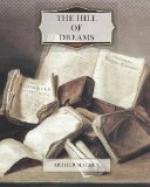a little more despondent, and harder to cheer even
for a moment; and the wall paper and the furniture
grew more and more dingy and shabby. The two cats,
loved and ancient beasts, that he remembered when
he was quite a little boy, before he went to school,
died miserably, one after the other. Old Polly,
the pony, at last fell down in the stable from the
weakness of old age, and had to be killed there; the
battered old trap ran no longer along the well-remembered
lanes. There was long meadow grass on the lawn,
and the trained fruit trees on the wall had got quite
out of hand. At last, when Lucian was seventeen,
his father was obliged to take him from school; he
could no longer afford the fees. This was the
sorry ending of many hopes, and dreams of a double-first,
a fellowship, distinction and glory that the poor
parson had long entertained for his son, and the two
moped together, in the shabby room, one on each side
of the sulky fire, thinking of dead days and finished
plans, and seeing a grey future in the years that
advanced towards them. At one time there seemed
some chance of a distant relative coming forward to
Lucian’s assistance; and indeed it was quite
settled that he should go up to London with certain
definite aims. Mr. Taylor told the good news
to his acquaintances—his coat was too green
now for any pretence of friendship; and Lucian himself
spoke of his plans to Burrows the doctor and Mr. Dixon,
and one or two others. Then the whole scheme
fell through, and the parson and his son suffered
much sympathy. People, of course, had to say they
were sorry, but in reality the news was received with
high spirits, with the joy with which one sees a stone,
as it rolls down a steep place, give yet another bounding
leap towards the pool beneath. Mrs. Dixon heard
the pleasant tidings from Mrs. Colley, who came in
to talk about the Mothers’ Meeting and the Band
of Hope. Mrs. Dixon was nursing little Athelwig,
or some such name, at the time, and made many affecting
observations on the general righteousness with which
the world was governed. Indeed, poor Lucian’s
disappointment seemed distinctly to increase her faith
in the Divine Order, as if it had been some example
in Butler’s
Analogy.
“Aren’t Mr. Taylor’s views very
extreme?” she said to her husband the
same evening.
“I am afraid they are,” he replied.
“I was quite grieved at the last Diocesan
Conference at the way in which he spoke. The dear
old bishop had given an address on Auricular Confession;
he was forced to do so, you know, after what
had happened, and I must say that I never felt prouder
of our beloved Church.”
Mr. Dixon told all the Homeric story of the conference,
reciting the achievements of the champions, “deploring”
this and applauding that. It seemed that Mr.
Taylor had had the audacity to quote authorities which
the bishop could not very well repudiate, though they
were directly opposed to the “safe” Episcopal
pronouncement.




